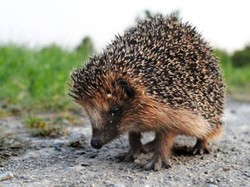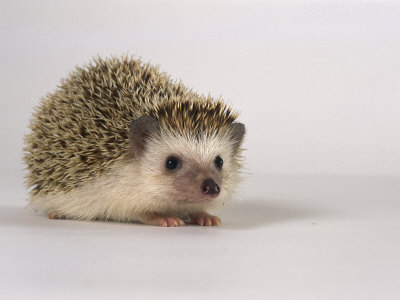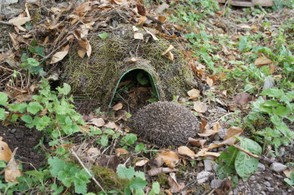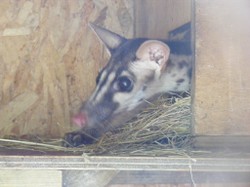It's hard not to love hedgehogs. They're adorable little creatures with furry faces, big beady eyes and strange spiky bodies. Yet more and more we seem to be pushing them to the edge of extinction. In the last ten years around a quarter of the UK's hedgehog population has gone, and things aren't looking to improve in the future. We should all be aware of the small changes we can make to preserve the life of our little backyard friends.

The Extinction of UK Hedgehogs
by Sethisis
Britain's only spiny mammal, the hedgehog is quietly dying out. The tiny animals are falling victim to our busy roads and boarded up gardens. What can we do to help?
What are Hedgehogs?
Hedgehogs are small nocturnal mammals that live in Europe, Africa, Asia and New Zealand. They're called hedgehogs because of their fondness for hiding in bushes, and because of their pig-like snouts.
Spines cover the entirety of their backs, these can vary in colour from grey to brown and black. These spines are their primary defence, so when they curl into a ball it's very difficult to hurt them.
Why are They Going Extinct?
While it's not known exactly why hedgehog numbers are in such a rapid decline, there are some obvious factors.
Extensive use of pesticides and slug pellets in our gardens mean there's less food for them, and they already have to compete with badgers who have very similar diets.
The urbanisation of the UK means there are less areas for hedgehogs to live safely; they're in danger from busy roads, and their hunting grounds are few and far between. As more and more people pave their gardens and block them up with fences or walls, hedgehogs find it harder to get around and find places to sleep.
What Can We Do To Help?
There are lots of ways we can help make a safe environment for hedgehogs!
Making or buying special hedgehog habitats (also known as Hogitats) means any wandering hedgehog can stay the night in your back garden. These little homes should have a tunnel shaped entrance so no larger predators can get in and disturb your little visitor while they sleep. You can also put food down for them; while their favourite food is slugs, hedgehogs will happily eat dog or cat food, berries or watermelon. It used to be common to give hedgehogs milk, but we now know that they're lactose intolerant, so just give them a little bowl of water.
Simply cutting a small hole in your fence (about 6 inches circumference) can give a hedgehog space to climb through. If you can, try getting your neighbours involved by doing the same, then you can create a hedgehog path through your street!
Also, using natural slug repellents means hedgehogs can eat your garden slugs without consuming any poison. Try wrapping seaweed or copper wire around the base of your plants (making sure it doesn't touch the stem). The salt in seaweed repels slugs, and the copper wire gives them a slight shock if they try to cross it.
Hedgehogs in the USA
While it seems hedgehogs are very rare in the USA, it's possible you might have some living nearby. In recent years, people have imported hedgehogs to keep as pets, unfortunately releasing them into the wild after being unable to tame them. It's to be noted that while hedgehogs aren't dangerous creatures, they are wild animals and shouldn't be kept as pets unless you're knowledgeable on how to look after them properly.
Of course, if you are lucky enough to have hedgehogs nearby, you should make your garden as hog friendly as possible. You could contribute to making hedgehogs more widespread in your state.
Do You Have Any Hedgehogs in Your Area?
The hedgehog preservation society is conducting a survey on hedgehog activity. They want people to let them know if they see a hedgehog so they can try to map their current numbers and hibernation patterns.
You can report your hedgehog sightings here.
You might also like
Owston's Banded Palm Civets (Chrotogale owstoni): Ringtails of...Synthetic substitutes decrease civet musk demand. Severe acute respiratory sy...
Asian Common Palm Civets (Paradoxurus hermaphroditus): Non-Rin...Asian common palm civets inhabit east, south, and southeast Asia. They like p...






 An Introduction to Minecrafton 04/19/2013
An Introduction to Minecrafton 04/19/2013
 What is Self Harm?on 03/26/2013
What is Self Harm?on 03/26/2013
 Moving Out for the First Timeon 04/02/2013
Moving Out for the First Timeon 04/02/2013
 Why Do We Love Cats?on 03/19/2013
Why Do We Love Cats?on 03/19/2013


Comments
You have a sad writer and gardener here! After years of trying to attract hedgehogs to my allotment, I arrived today to find a dead one. There was no blood, so the resident fox is not responsible, and there are no poisonous pellets on my plot, but there is a virus going round that attacks hedgehogs. I buried it in one of the vegetable beds. Let's hope that she left offspring.
I feel sorry for the hedgehogs. I feel we are not doing enough to protect the species in our eco-system. Men continues to exploit earth for his selfish interests jeopardizing the beautiful earth that is the only known planet to support life in this huge universe.
I'm seriously going to look out for hedgehogs now. Thanks for this. <3
A very good informative article. I had never heard of Hogitats before.
Yes, me too, I think that the use of pestizides and the effects of urban life can endanger the hedgehog and other species. Great article!
Excellent article! Hedgehogs are such sweet and lovely little creatures that like many other species fall victims to the loss of their habitat, human activity and urbanization. Have never seen a hedgehog in the city that I live but I have encounter a few when travelling to various rural areas.